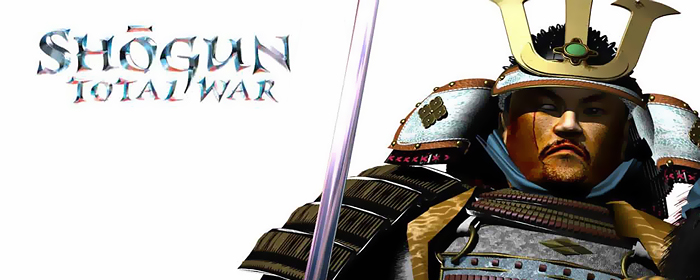About Shogun: Total War
Set against the backdrop of the Sengoku Jidai (Warring States) period from the 15th to the beginning of the 17th century, Shogun: Total War is a real-time tactics and turn-based strategy game with a strong focus on historical authenticity. Players assume control of a daimyo (leader) of a contemporary Japanese clan and attempt to conquer the nation and claim the title of supreme Shogun, the undisputed military ruler of Japan.
The gameplay consist of two parts – a turn-based Risk-style mode on a 2D campaign map of Japan where the player must recruit, manage and move their armies, conduct diplomacy, trade, espionage, sabotage and assassinations. This 2D map however ultimately serves to provide context for the 3D real-time battles that make up the main part of the game and occur whenever your army crosses into enemy territory or two opposing forces meet on the campaign map.
At the beginning of the game the player must choose from seven playable factions, each with their own daimyo and each complete with their own strategic advantages and disadvantages. The factions each control various historical provinces which allow for the cultivation of farmland, the construction of border watchtowers, castles and occasionally mines or ports. Castles can expand with space for auxiliary military buildings and dojos which, in conjunction with the game’s technology tree enable the player to unlock new abilities, recruit new unit types and agents, for example Ninja and Geisha Assassins. Recruitment and building is limited by the amount of Koku (money) in the player’s treasury, so thinking economically is crucial.
Armies consist of contemporary Japanese military units such as spearmen, cavalry, musketeers and archers and are led by a general that possesses an honour rating that rises or falls based on his military successes or failures. If a general experiences relentless defeat he may commit seppuku (ritual suicide). A clan’s daimyo and his of-age heirs are also represented as generals and if a daimyo is defeated and has no heirs to succeed him that clan is removed from the game.
Troop morale is an important aspect in Shogun and is determined on the battle field. Events such as a general’s death or sustaining heavy losses will decrease a unit’s morale– keeping your soliders well-supported and happy will ensure they do not flee from combat. Enemy cavalry will make confetti of routing foot-soldiers. In order to secure victory in the real-time battles the player must utilise strategies that take full advantage of factors such as the increased projectile range and advantage to cavalry that accompanies elevation of the land and the ability to draw custom unit formations with the mouse whilst also taking care to ensure factors such as friendly fire are considered to minimise damage. Environmental obstacles and features such as rivers and cover can also be used to great effect, for example massacring swathes of enemies by forcing them to cross a bridge where carefully positioned ranks of musketeers and cavalry await them. Careful planning and implementation of these strategies Sun Tzu’s Art of War is central to the game; its strategies are frequently quoted and recommended and the enemy AI was developed with the book’s teachings in mind.
The game features a multiplayer where players must compete in custom battles in order to acquire honour points which are displayed next to their names. Considered by many fans to be the most skilful and purest Total War game, Shogun’s multiplayer is unforgiving to mistakes, heavily reliant on skill in army selection and more importantly, management. Any army can defeat another with the implementation of fast, clever and precise military strategies.
Released in June 2000, Shogun: Total War is the first game in the Total War series. It was developed by the Creative Assembly and published by Electronic Arts.
